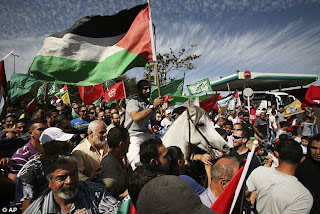I'm still trying to wrap my head around the recent Israeli – Palestinian prisoner swap. Now I was never all that great at Math, but something about trading one Israeli Jewish soldier for one thousand disgruntled Palestinian Arabs doesn't quite add up.
The problem I have is not so much the seeming disparity of the swap deal. What I'm looking for is the “why” behind it.
On a superficial level, prisoner swaps are not all that uncommon. Every war where prisoners were taken almost indefinitely included a swap following the cessation of hostilities. Both sides relinquished their prisoners, wished them well, and that was that.
But things in the Middle East are much more complicated. Palestinians view the Israeli government as occupiers, Israeli troops as infidels or apartheid enforcers. And to be expected, Palestinian “freedom fighters” are viewed by Israel (and much of the world) as terrorists, nothing more. Whichever way you spin it, both sides view the other as illegitimate combatants and thus subject to prosecution and incarceration.
And some of it is deserved. From my perspective, anyone who straps on a suicide vest and blows up a cafe full of innocent civilians is committing a criminal act and deserving of prosecution. War is not an excuse to violate the rights of civilians. And some of those released in the prisoner exchange were those types.
But likely some were imprisoned unjustly, caught up in the dragnet of overzealous Israeli soldiers. Whatever the case, the Israeli government overlooked the offenses committed and decided it had something to gain by letting a good chunk of their Palestinian prisoners go free. Question is, what do the Israeli's gain?
The first benefit is likely monetary. The cost of incarcerating 1000 prisoners is likely quite high. In Canada we average between $84,000 and $344,000 per year per prisoner. Given the reports of Israeli prison conditions by released Palestinian prisoners, the amount Israel spends on its prisons is certainly lower than in Canada, but substantial nonetheless. Given that some 5000 Palestinians are held by the Israelis, the swap might be welcomed by prison wardens and Israeli taxpayers alike.
If even $40,000 is spent per Palestinian prisoner, that comes to some $200,000,000 per year. Seeing that some Palestinians have been imprisoned for over 34 years and many others are serving life sentences, the economic benefit of releasing a fifth of the Palestinian prison population is quite obvious indeed. It also gives the Israelis a thousand free prison spaces, lest any future intifadas or violence erupts.
The second benefit to Israel is an increase in political capital. Benjamin Netanyahu, traditionally opposed to any sort of appeasement behaviour, can be seen as having taken a proactive step in ensuring the continuation of the peace process -- without violating the sacrosanct and thorny issue of land rights.
But the swap also comes at some expense for Israel. Releasing convicted terrorists violates every established precedent regarding the Western World's attitude towards extremism. In an abstract way, it runs the risk of emboldening others to participate in the type of behaviour that precipitated the incarceration in the first place. According to Al Jazeera:
Ismail Haniyeh, a senior Hamas official, addressed the crowd that Hamas said numbered over 200,000, praising the kidnap of Shalit as a positive operation that had won the freedom of hundreds of Palestinians. "Some described Shalit's captivity as a worthless adventure, but today they are proven wrong," he said. "The people want a new Gilad!" the crowd chanted, suggesting the abductions of Israeli soldiers would mean freedom for thousands more Palestinians imprisoned in Israel.
It also is likely to swell the ranks of Hamas -- especially the militant wing that launched the operation to capture Galid Shalit-- who will undoubtedly exploit the success of the swap to their own advantage.
Interestingly, many of the more “dangerous” prisoners were released into the more secure (at least from an Israeli perspective) Gaza Strip instead of the West Bank, likely to the relief of the Palestinian Authority who tend to be on better terms with the Israelis. The released prisoners were also given a warning not to engage in any “bad stuff” lest they end up back in the not-so-good graces of the Israelis.
There is an obvious question in all of this: is one man's freedom worth letting a thousand murderer's go free? Of course, this takes us back to what we consider a murderer to be. If there is a consensus view that the Palestinian prisoners are in fact soldiers and protected by International Law, then so be it. However, as soldiers they are still held to the test of International Law. Did they deliberately target and kill innocent civilians or were those they killed “collateral damage”?
But there is still much to consider. What about the cries for justice from the families of Israeli terrorist victims? Will this embolden the Palestinian terrorists to commit future attacks? What of the remaining Palestinian prisoners? Why justice for some prisoners and release for others?
I'm always interested in how people justify their actions. Whenever I hear some bizarre reason for a violent and unexplainable act -- be it committed by a liberal democracy or some obscure terrorists gang operating out of the jungle -- I try very hard to connect the dots.
But what I have come to realize is that it is not always possible to join the dots, or rather, find a single logical answer that will explain the irrational human dilemmas we face. Perhaps Netanyahu's prisoner swap simply boils down to doing whatever it took to ensure the return of the metaphoric lost sheep. Maybe he was hoping for a fresh start with the Palestinians, a token of goodwill in the hopes of peace.
Whatever the motivations, both sides got most of what they wanted -- at least for now.


No comments:
Post a Comment